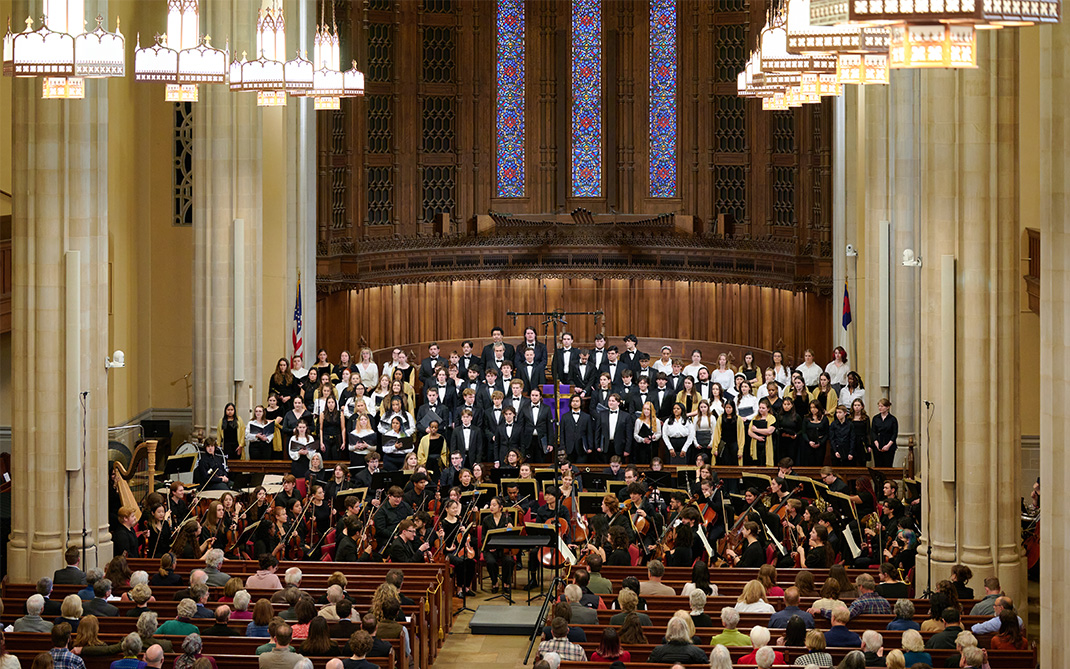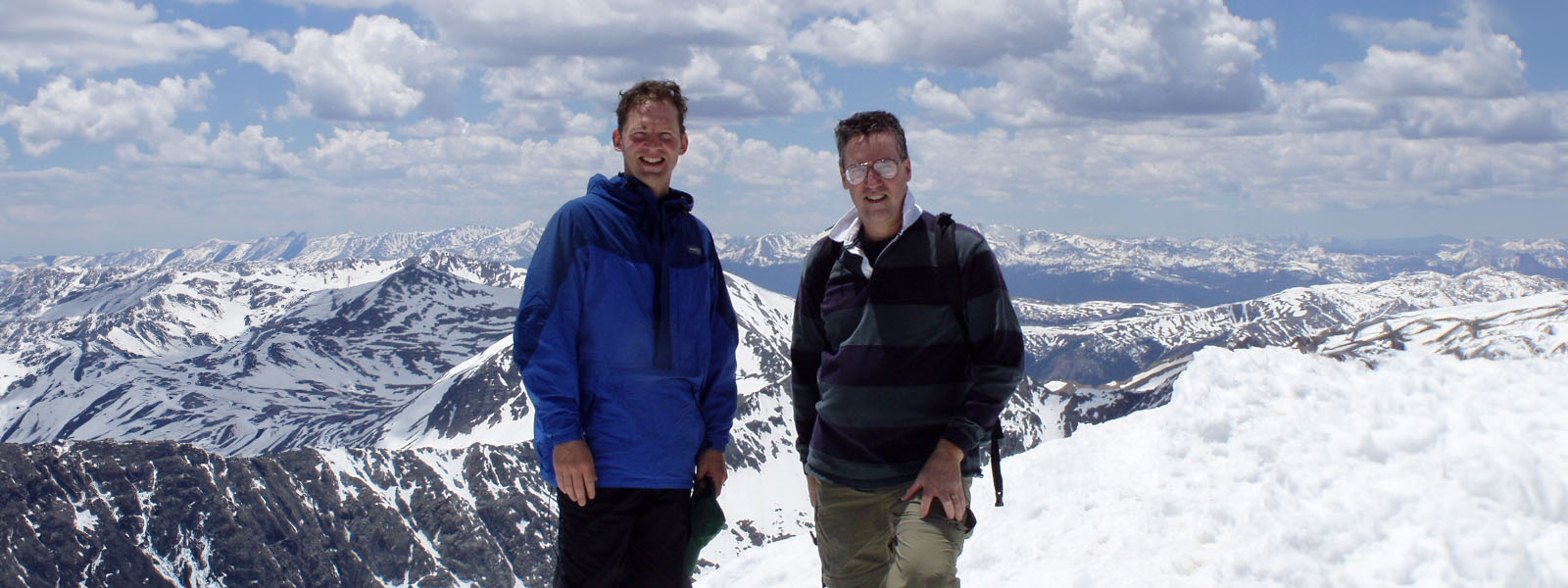From flute to fields: The unexpected journey of UNCSA alumnus Walter Kuentzel
Alumnus Walter Kuentzel ('73) was a flute student in UNCSA's High School Music program when an impromptu camping experience set him on an entirely new path. His group had travelled to Linville Gorge, North Carolina, hoping for a music-filled experience at Union Grove Fiddler’s Convention. But when they found the convention sold out, Kuentzel and his friends took their camping gear further into the forest instead.
After hiking to the bottom of the gorge and back, Kuentzel had a surprising experience: “I remember feeling the same type of powerful emotional response moving through this wild magical landscape as I would sitting in a concert hall listening to a well-performed piece of music,” he recalls.
For Kuentzel, this weekend began to inspire a new career direction. After graduating from UNCSA, he first pursued an undergraduate degree in philosophy, then worked in outdoor education, adventure programming and retail before earning an M.S. in Parks, Recreation, and Tourism Management and a Ph.D. in Sociology, with a focus on social psychology and human behavior in the emerging field of environmental sociology.
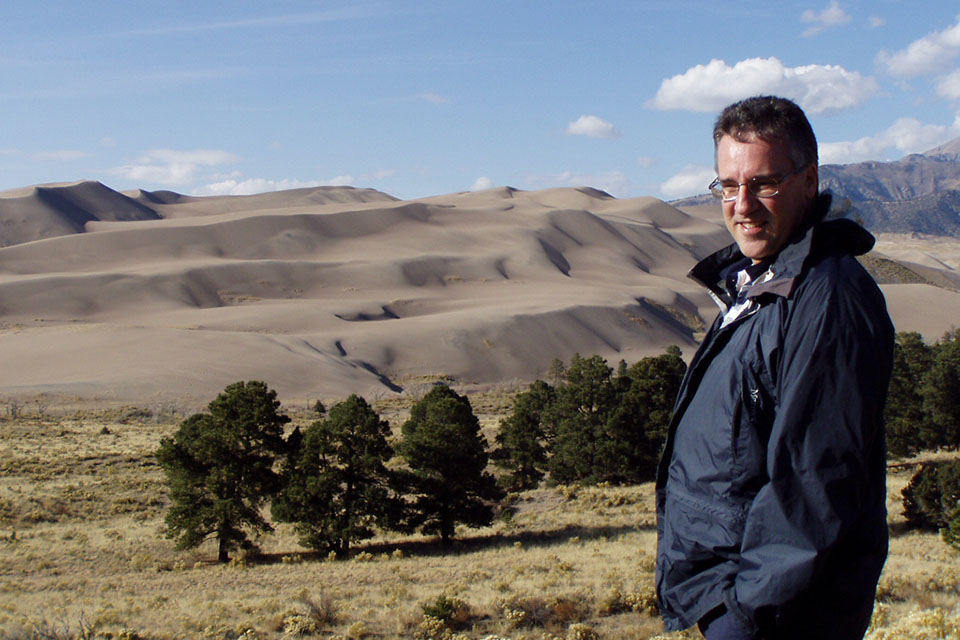
Walter Kuentzel at the Great Sand Dunes National Park and Preserve in Colorado.
Kuentzel has since had an engaging 35-year career teaching in the Rubenstein School of Environment and Natural Resources at the University of Vermont (UVM). He's now returned home to North Carolina to retire but remains involved with UVM teaching in a study abroad course in Costa Rica and consulting with Partners for the Americas and their Farmer-to-Farmer program on agritourism development projects in Guyana and the Dominican Republic.
Though the majority of his career was not arts centered, Kuentzel says that his creative aspirations now are less about refined performance and more about generating innovative content around environmental issues. To current and future UNCSA students, he offers this advice: “I think it is important to find a balance between curiosity about the complex and diverse world around us while at the same time staying focused on one’s artistic training.”
Where did you grow up and how did you find your way to UNCSA?
I grew up in Davidson, North Carolina. As a child, I was generally an average performer in school, a slow athlete and mostly an introvert who lacked any leadership skills. During those years, however, I did excel in music lessons and school band classes. When my family moved to Winston-Salem before my junior year in high school, my brother and I auditioned at the School of the Arts.
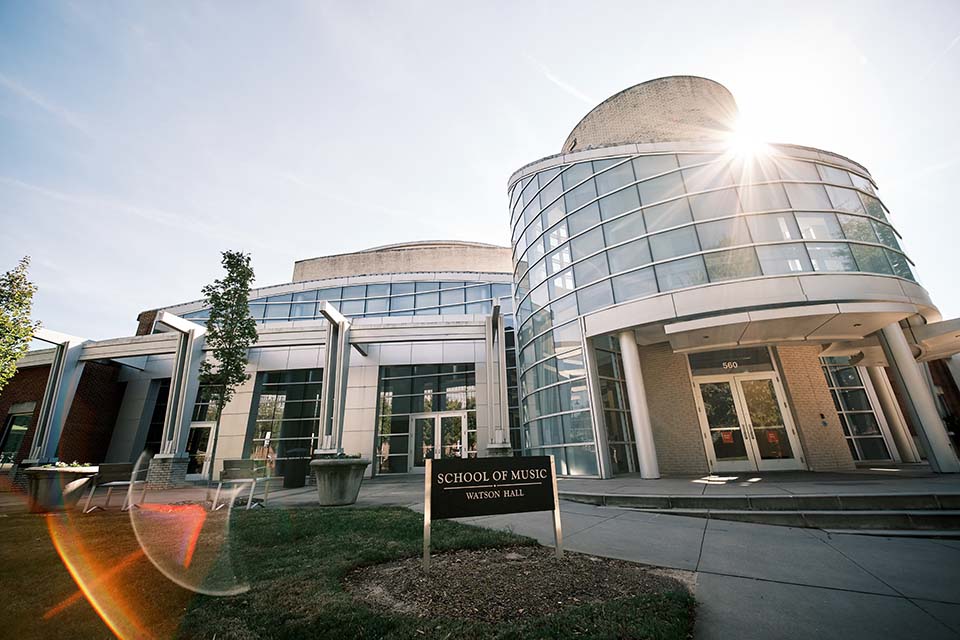
Watson Hall at UNCSA.
I remember thinking my audition was pretty average for someone coming out of public school band training. My expectation for acceptance into the program was low, particularly when I heard some of the sounds coming out of the other rooms in the offices of the music faculty. I was shocked to receive an admission letter a few weeks later. I suppose I showed sufficient promise as a 16-year old, and I think my North Carolina residence was an advantage.
I came a long way as a musician in the two years I spent at NCSA, and I loved the performances and learning environment. However, I struggled with the repetitive nature of practice, the rehearsals, and the music theory classes. In the end, I realized that I lacked the commitment to bring out my best, and the focus to do the necessary hours of practice — after graduation from the high school program, I decided to go to a four-year liberal arts college where I majored in philosophy.
How did you enter the field of Environmental Sociology?
I am now retired after spending 35 years in an academic career focused on environmental management, first as an instructor, then a graduate student, and finally in a tenured faculty position at the University of Vermont.
I took a hard pivot from a music career, although the redirection had started while I was still at NCSA. I remember during spring break in 1973, a group of us had traveled to the Union Grove Fiddler’s Convention, a blue-grass music festival near Statesville. When we arrived, the tickets were sold out, so I suggested we travel a little further down the road to Table Rock and the Linville Gorge Wilderness and camp there for a couple of days.
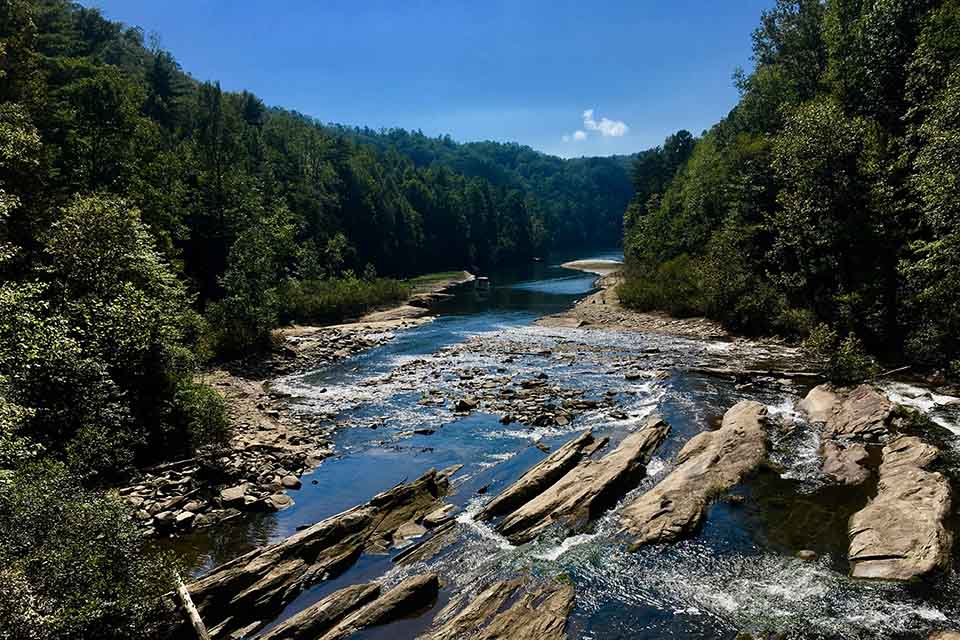
The Linville Gorge in North Carolina / Photo: Dillon Groves
We arrived late at the Table Rock parking area and set up camp in a beautiful site overlooking the gorge on one side and the Catawba River Valley on the other. Then the next day we hiked straight down into the gorge to the bottom where the Linville River flows. The hike was extremely demanding, but in the height of spring on a warm sunny day it was a spectacular experience. I remember feeling the same type of powerful emotional response moving through this wild magical landscape as I would sitting in a concert hall listening to a well-performed piece of music.
From there, my fascination with the natural world continued and I developed skills in outdoor education and wilderness adventure programming. I worked in summer camps that featured backpacking, rock climbing and whitewater canoeing activities. After college, I worked in the outdoor equipment industry doing retail sales, manufacturing, and wholesale sales, and as an independent sales representative for a variety of equipment manufacturers. In 1985, I returned to wilderness programming at the college level teaching outdoor education classes at Brevard College.
After Brevard, I went to Clemson University to do an M.S. in Parks, Recreation, and Tourism. There, I discovered there was a specialty that examined the relationship between social psychology and natural resource management. I moved on to do a Ph.D. in sociology from the University of Wisconsin Madison, specializing in social psychology and in the emerging field of environmental sociology. This dramatically expanded my interest beyond outdoor recreation to include issues of rural development, the political economy of resource extraction, sustainable development, environmental conflict, crowding and carrying capacity at national parks and so forth.
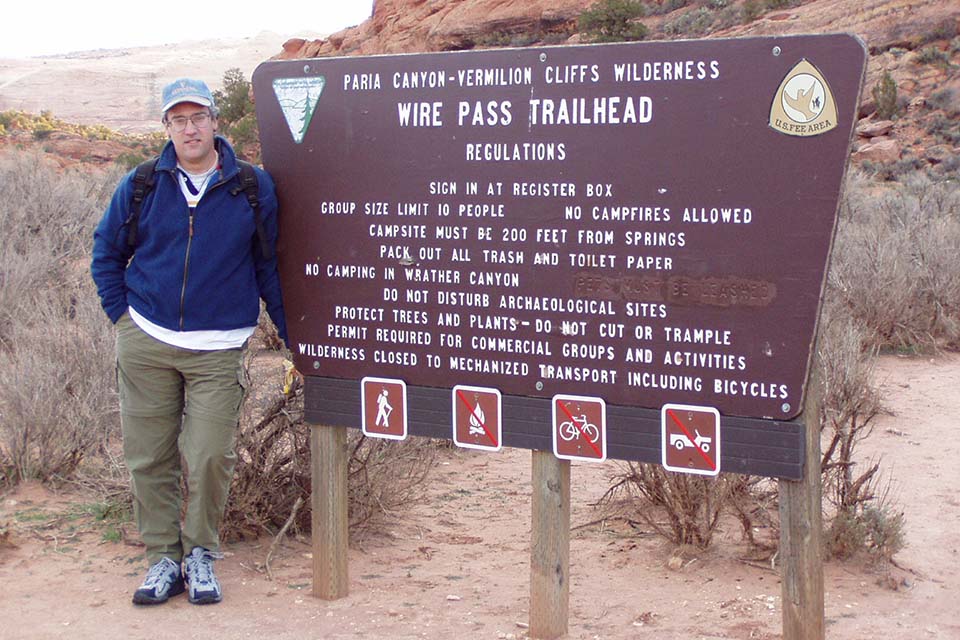
Alumnus Walter Kuentzel in southern Utah.
After completing a Ph.D., I landed at the University of Vermont in their School of Environment and Natural Resources in a teaching and research appointment. Classes I have taught over the years include ecotourism and sustainable development, environmental history, wildlife and society conflicts, environmental sociology, human behavior and the environment and rural development.
What was one of your favorite projects that you were part of?
One of my favorite projects I worked on was a controversy over hunting at Cape Cod National Seashore. A couple of animal rights organizations had sued the Park Service over hunting practices within the Seashore, and the court had ordered the park to conduct an Environmental Impact Statement (EIS) on their hunting practices and policies.
I was hired to do the social science portion of the EIS. It was an extremely contentious issue with many difficult public meetings and a lot of money and time invested by the animal rights groups to eliminate hunting within the park boundaries. I conducted attitude surveys among hunters, Cape Cod residents, and Seashore visitors and found little opposition or knowledge about hunting within the park among 2000 respondents.
As a result of my research, the park eliminated a stocked pheasant hunt, added a spring turkey hunt, and left everything else (deer, waterfowl, small game regulations) the same. Overall, the project was an intense whirlwind that drew on everything I had learned to negotiate my way through the process.
In retirement today, I continue to teach a class on rural development in Costa Rica to UVM students who are part of a semester abroad program that I helped developed. I have also had the opportunity to do consulting work with Partners for the Americas and their Farmer-to-Farmer program on agritourism development projects in Guyana and the Dominican Republic.
What do you see as some of the most important skills you learned during your training at UNCSA and how have those skills informed your career?
While at NCSA, I was in the midst of typical teen angst without a clear idea about the future. In hindsight, those last two years of high school may have been more about what I did not want to do in the future — the regimentation of practice, the repetition of skill development, the ability to focus and close out the world as you concentrate on becoming better at your instrument.
In my academic career, I thrived on the emergent qualities of discourse like rhetoric, argument and debate. I felt more comfortable within a generative process that pushes the bounds of knowledge and offers original narratives and accounts of the natural world. My creative aspirations now are less about refined performance and more about generating innovative content about environmental issues.
What advice do you have for current students, whether they’re studying music or other specialties?
UNCSA is a unique opportunity. Most people who are committed to their specialty already know this. I tended to take this for granted and was easily distracted from my specialty. I think it is important to find a balance between curiosity about the complex and diverse world around us while at the same time staying focused on one’s artistic training.
Get the best news, performance and alumni stories from UNCSA.
SUBSCRIBE TO OUR NEWSLETTERS(OPENS IN NEW TAB)(OPENS IN NEW TAB)(OPENS IN NEW TAB)
May 14, 2024
